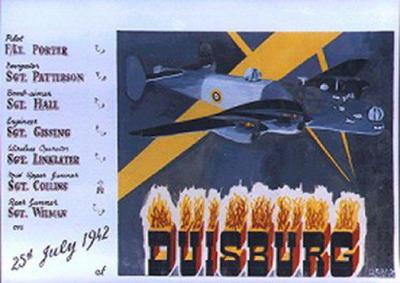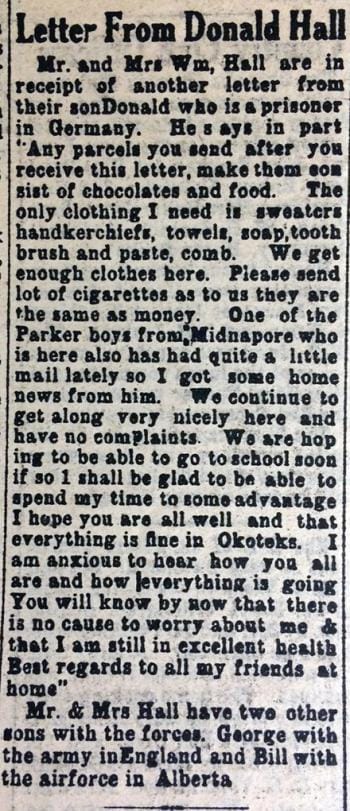
Donald Hall was born in the Big Rock area west of Okotoks in 1922, and the family moved into town when Don was age 6.
“As soon as I had my 18th birthday, I hitchhiked a ride to Calgary to the RCAF [the Royal Canadian Air Force] recruiting office. At the medical the doctor said my pulse was too slow for the aircrew standards but he told me to step up and down on a chair for a few minutes. Then he took my pulse and my count was good. So I was told to go home and await my call up.” – The Personal World War II Memoirs of F/O Don Hall.
After training and postings in Canada, Don arrived in England on Christmas Day, 1941. He participated in the 1,000-plane raids over occupied France beginning in May 1942 serving as a flight officer with the 158 RAF, Halifax Squadron with F/L Geoffrey Hall Porter of the Royal Air Force as the crew’s pilot. Porter was 29 years old – older than the rest of the crew – therefore he earned the nickname ‘Pop’.
“We were shot down on the night of July 25, 1942. It was a clear moonlit night and we got right to the target which was Duisburg. As we were on our bomb-run, the searchlights caught us and we were bright as day. I immediately closed the doors and Pop took violent evasive action. I thought the wings would be torn off. The ‘ack ack’ was bursting all around and flak hit the airplane but nothing serious. Pop escaped from the searchlight but we had lost a lot of altitude. We were around 12,000 feet and in easy light ‘ack ack’ range. We were lining up for our bomb-dropping again when suddenly we were hit by cannon fire from a Messerschmitt 100 night fighter. He came in from about 8 o’clock and underneath us. He flew away about 2 o’clock and I fired a burst of machine fire at him. I don’t think I hit him but I think it scared him because he didn’t return. His burst had killed the mid-upper gunner. It had set fire to the two starboard engines and fouled up the hydraulic system. . . Pop tried to keep the plane flying but with only two engines and the drag from the bomb doors, that made it impossible to maintain altitude. When we reached the Dutch border and our altitude was only 4,000 feet, Pop gave the command to abandon aircraft.” – The Personal World War II Memoirs of F/O Don Hall.

Don Hall created this painting while a prisoner of war at Lamsdorf. It depicts the crew’s Halifax bomber over Duisburg on July 25, 1942. Don presented it to Pop Porter at the RAF ex-POW Reunion in Toronto in 1980. From the Personal World War II Memoirs of F/O Don Hall.
Don made it safely to the ground, but was captured the next day. He spent a few days in solitary confinement at an Amsterdam prison where he underwent interrogation and then was sent to the prisoner of war camp at Lamsdorf, the infamous Stalag VIIIB.
“At the stalag, we were photographed, fingerprinted, given a number (mine was 25074) and a dog tag. We were issued a spoon and a fork, a mess tin, two blankets, a straw-filled paillasse and bed boards for our bunks. At times, I thought the paillasse contained more fleas than straw. We were assigned to a compound consisting of four barrack blocks. There were about 1,000 men in our compound and there were more arriving periodically. The Germans considered air crew to be prone to escape and also valuable, so our compound was in the centre of the stalag too far away from the perimeter barbed wire to dig tunnels…” – The Personal World War II Memoirs of F/O Don Hall.

Newspaper clipping from Okotoks Review, Dec. 11, 1945. Okotoks Museum and Archives.
In his memoirs, Don states: “The two most dangerous periods for PoWs was when first captured and when a war draws to an end. Apparently, Hitler was all for lining us up and shooting us all to get us out of the way. The German Generals refused to do this.” Instead, Stalag VIIIB was evacuated on Jan. 22, 1945 and prisoners were force-marched through bitterly cold temperatures and deep snow-covered roads. Little did Don know that he would be marching for the next three months, passing near the towns of Gorlitz, Bautzen, Zeitz, Jena, Erfurt and Duderstadt, and a 10-day march through the Carpathian Mountains which Don says “actually they were hills and they reminded me of the foothills west of Okotoks.”
“We slept in barns and it was really a survival thing. Your boots got wet while marching and if you took them off at night, they froze and if you left them on, your feet froze. The only alternative was to put them close to your body and if the straw was deep enough, bury them and sleep on top of them…”
“We were getting in desperate condition, health-wise. Diarrhea developed into dysentery. We were filthy and so were our clothes. We were lousy but seemed to have no fleas so I guess these pests couldn’t cohabitate. Food was very little or non-existent. Sleeping in barns or in the open with only a thin blanket caused colds and sickness…. As we marched west and spring approached the cold became less of a problem. Dysentery became more of a problem… On April 12, we were in a town called Duderstadt. During the night the guards had disappeared from the barn and American tanks were in plain view… There was no opposition to them and outside of the few SS soldiers we had not seen any German forces which could have opposed them.” – The Personal World War II Memoirs of F/O Don Hall.
After liberation, Don was first sent to England and then sailed to Canada aboard the French ship, Louis Pasteur. He disembarked at Halifax, took a train to Winnipeg, and then on to Calgary where his mother met him at the station. They took the bus to Okotoks.
“So the circle was complete and I was one happy young man to have survived and make it home to my family.”
After the war, Don attended the University of Alberta, and later taught in Okotoks from 1968-1976.
A copy of Don’s memoirs, entitled “The Personal World War II Memories of F/O Don Hall (RCAF Ret’d),” was donated to the Okotoks Museum and Archives by his family. The above excerpts included here are just a snippet of the remarkable stories of Don’s determination and survival -- which also includes two attempted escapes from the POW camp! Don’s memoirs are also included in the memoirs of Wing Commander Geoffrey Hall, entitled “Pop’s Progress.”

